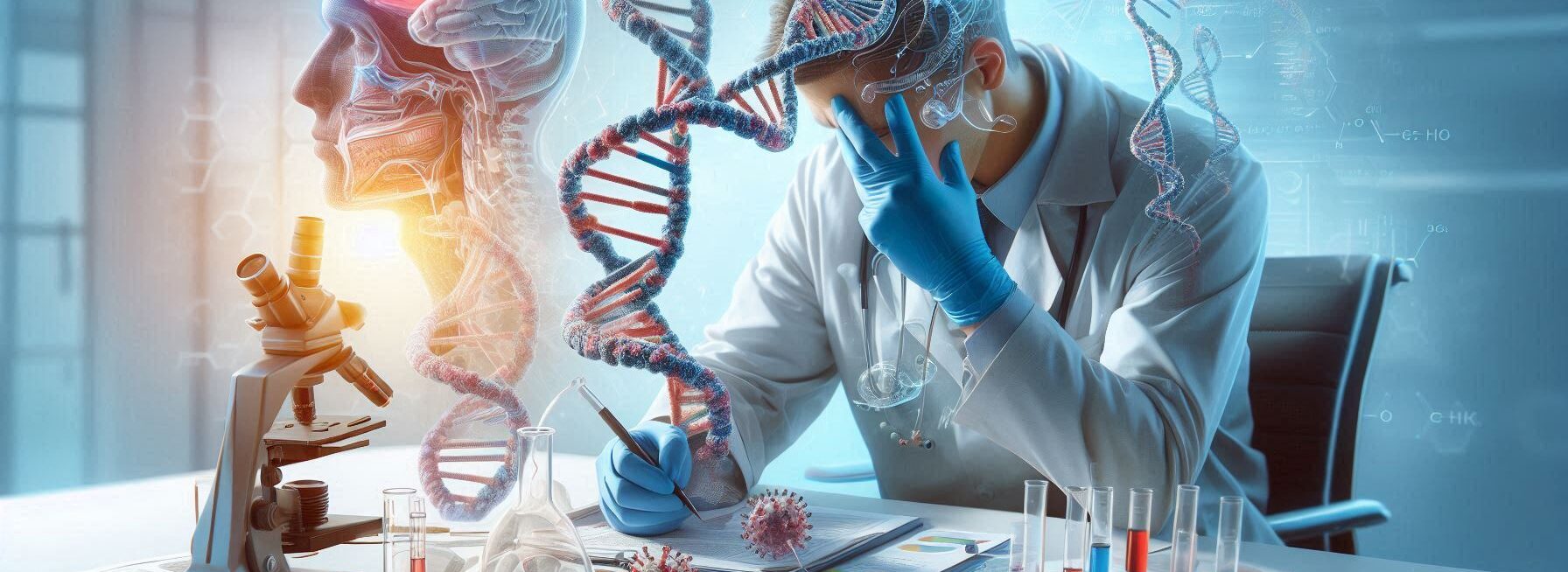Ah, genetics! That wonderful science that explains why I have my mother’s eyes and my father’s inability to resist a second helping of dessert.
But when it comes to major depressive disorder (MDD), genetics plays a much more serious role than just determining who inherits Grandma’s collection of ceramic frogs.
So, let’s dive into this genetic pool—hopefully without drowning in confusion!
Top Takeaways and Key Concepts
- Recognize that genetics can increase depression risk but doesn’t guarantee it.
- Consider both nature (genes) and nurture (environment) in mental health.
- Seek supportive relationships and engaging activities to counter genetic predispositions.
- Use genetic testing for insight, not as a definitive prediction tool.
- Address environmental stressors proactively to reduce likelihood of depressive episodes.
The text explains how major depressive disorder (MDD) arises from a combination of genetic and environmental factors. While inherited genetic variations can increase vulnerability, they do not guarantee depression, and life experiences play a significant role in shaping mental health outcomes. Supportive relationships, hobbies, and proactive self-care can mitigate genetic risk, while environmental stressors may trigger depressive episodes even in those without a family history. Genetic testing can provide insights but should be used as a guide rather than a definitive predictor. Overall, understanding both biology and personal experiences helps individuals manage depression more effectively.
What Are Genes Anyway?

By the way, genes are like tiny instruction manuals for our bodies. They tell our cells how to function, what color our hair will be, and whether we’ll ever be able to grow a mustache that rivals Tom Selleck’s. In short, they’re pretty important.
Now, when we talk about MDD, researchers have found that certain genetic variations can increase the risk of developing depression.
It’s not as straightforward as saying “If your mom was sad, you’ll be sad too,” but there is evidence suggesting that if you come from a family where depression has been an unwelcome guest at every holiday gathering, you might be more likely to deal with it yourself.
Interestingly enough, while having a family history of depression can increase your risk, it doesn’t guarantee you’ll end up feeling like Eeyore on a rainy day.
Think of it this way: just because Aunt Mildred hoards cats doesn’t mean you’ll start collecting them too—unless you really want to!
Let’s see… here we enter the classic debate: nature versus nurture. On one side are those who believe our genes shape us like clay in the hands of an artist; on the other side are those who argue that life experiences mold us into who we become—like Play-Doh left out overnight (which is never good).
Research shows that both factors play significant roles in mental health. You could inherit all sorts of funky genes from your ancestors—like the gene associated with serotonin transport—but if you’ve got supportive friends and engaging hobbies (or even just Netflix), those positive influences can help counterbalance your genetic predisposition.
Speaking of which, think about your own experiences! Maybe you had a rough childhood or faced some tough challenges along the way; these factors can interact with your genetic makeup and influence whether or not depression rears its ugly head. So yes, while genetics matter significantly in MDD, they don’t write the entire story.
The Science Behind Genetic Testing
Honestly, if you’ve ever thought about getting tested for genetic markers linked to MDD—don’t worry; you’re not alone!
There are companies out there offering tests promising insight into your mental health risks based on DNA analysis.
Imagine sitting down with a cup of coffee and reading through results that say something like “Congratulations! You inherited 50% of Dad’s tendency to brood over missed opportunities!”
While these tests can provide some interesting information—and perhaps even explain why you share so many traits with Uncle Bob—they aren’t definitive answers regarding whether you’ll develop depression or not.
After all, knowing I’m genetically prone to sadness won’t stop me from binge-watching reality TV until 2 AM.
To be fair though, understanding potential genetic vulnerabilities could empower individuals by encouraging proactive measures—like seeking therapy or practicing self-care techniques before things spiral out of control.
Environmental Factors Matter Too
All things considered, environmental factors also have a huge impact on mental health outcomes—even if you’ve inherited every single melancholy gene known to humankind.
Life events such as trauma or loss can trigger depressive episodes regardless of one’s genetic background.
For instance, let’s say someone has inherited genes linked to MDD but lives in an environment filled with love and support—a nurturing partner who makes terrible puns during movie night may help keep those dark clouds at bay!
Conversely, someone without any notable family history but living through significant stressors might find themselves grappling with feelings of despair.
So remember: genetics may load the gun—but it’s often life circumstances that pull the trigger!
Conclusion: A Complex Web
On the whole—and despite what some melodramatic soap operas would lead us to believe—the interplay between genetics and environment creates a complex web when it comes to major depressive disorder.
It isn’t merely about inheriting “the sad gene” from Mom—it involves countless variables working together (or against) each other throughout life.
In conclusion? While understanding our biological make-up helps us navigate mental health challenges better than trying to solve them using only guesswork or Googling symptoms late at night while wearing pajamas—you know what I mean—it remains crucial not to overlook personal experiences and social connections along this journey toward healing!
Suggested Resources:
Understanding Depression: A Guide
https://www.nimh.nih.gov/health/publications/understanding-depression
Genetics Home Reference – Depression
https://ghr.nlm.nih.gov/condition/depression
The Connection Between Genetics and Mental Health
https://www.psychologytoday.com/us/blog/the-legacy-loss/202010/the-connection-between-genetics-and-mental-health
Frequently Asked Questions
Can genetics increase the risk of major depressive disorder?
Yes. Certain inherited genetic variations can raise the likelihood of developing major depressive disorder, but they do not guarantee it will occur.
Does having a family history of depression mean I will develop it?
No. A family history may increase risk, but environmental factors, lifestyle, and support systems play major roles in whether symptoms appear.
How do genes and environment work together in depression?
Genes may create vulnerability, while environmental stressors such as trauma, loss, or chronic stress can trigger depressive episodes.
What role does genetic testing play in understanding depression risk?
Genetic testing can provide insights into vulnerabilities but cannot predict depression with certainty. It is best used as an informational tool.
Can supportive relationships reduce genetic risk?
Yes. Positive social connections, healthy activities, and strong support systems can help counterbalance genetic predispositions.
Are environmental stressors as important as genetic factors?
Absolutely. Stressful life events can influence depression risk even in individuals without a genetic predisposition.
What steps can help manage genetic vulnerability to depression?
Building coping skills, strengthening relationships, maintaining routines, and proactively addressing stressors can reduce the impact of genetic risk.

Kevin Collier is a passionate mental health advocate and writer for SadFAQ.com, where he explores the complexities of depression and mental well-being. With a deep understanding of mental health challenges, Kevin provides compassionate insights and practical advice to help individuals navigate their journeys toward healing. His articles aim to destigmatize mental health issues, offering support and resources for those seeking to improve their emotional resilience. Committed to raising awareness and fostering open conversations, Kevin’s work empowers readers to prioritize their mental health and seek the support they deserve.




